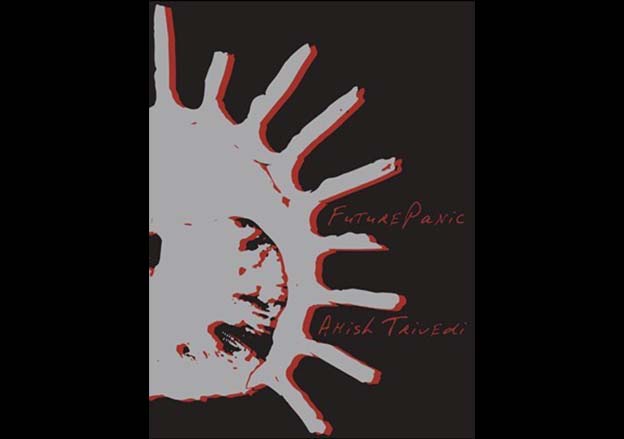from 'FuturePanic,' new poems with notes by the author and the publisher

The universe, too,
is held together by the same gravity
that holds us together. The same abyss
swallows us all,
and our hate cannot command the sea —
we cannot beg it back,
deny it any longer. But we can fight on, stare
deep into the abyss that threatens and
reach back away because that’s what we do
for one another in the trials
we face in our time in our place
in our spirit in our replication in our ecosystem
in our lust our anger.
***
How easy it must be
to do nothing — to let time
occur, to let event
and emotion ebb
or flow free. How nice
it must be
to hold time
as equity. How nice it must be
for the future to always appear
as perpetual replicator. How nice
it must be to allow time
to solve all issues
and remove oneself
as agent.
***
But who holds time, possesses it
feels ownership over it? Time
is a disease, a lingering pustule,
and memory is the sly trace
of it. What is written down
is supermemory, hyper-
memory. To fetishize it,
to offer it gift it present it
take it make it tease it
be in denial of it. I am not afraid
because there is nothing here
we didn’t invent.
AUTHOR’S NOTE
It would be a terrible cliché to say that the five sections of FuturePanic (Co•Im•Press 2021) mirror the stages of grief — and rather inaccurate. However, the path of the text is certainly from a kind of darkness to a kind of light, from the cold emptiness of space to the warm interior of the body, of the heart. What we have to find is one another in that void, in the replicating automata and grey goo of destruction, we’re reaching instead for the reproduction of sounds we know.
Maybe at the center of the book is the idea that the world does not exist for us, a feeling that seems to be getting lost in our present moment. I read about an Asian pottery company where the workers knew it would take hundreds of years for their pottery to harden and thus would leave instructions for whomever would come along in the future to do any painting work. Four hundred years, a mere blip of time, I thought, but do we have that kind of long thinking in our present? Maybe it’s impossible to see around the present terrors we’ve worked ourselves into — political chaos, climate change. Maybe it’s impossible to even imagine the world of four hundred years from now when we do not know if it’s capable of existing in any way a modern human can recognize.
These terrors, attempts to understand time, weave throughout FuturePanic, which Co•Im kindly called “Four Quartets for the Millennial set.” Indeed, I think poets and artists are always grappling with the questions that FuturePanic is dealing with, bigger than just our moment, but attempting to look at a lot of time as something which will and has already happened in some ways around us. Much of twentieth-century philosophy has attempted to deal with these questions, which is no doubt where I turned while writing the book.
I said in a talk recently that FuturePanic is a hard book to describe in the way that some novels are difficult to describe because they are too big for a simple sentence or two to encapsulate. In some ways I think of this book as everything — a grand unifying theory of sorts. Perhaps that’s overreaching, but I don’t want to shy away now from any kind of grand pronouncements. I mean — why bother now?
PUBLISHER’S NOTE
FuturePanic
Amish Trivedi
Co•Im•Press, 2021, Perfect Bound Trade Paperback, 6" x 8"
Sweeping and subversive and anxious and heartfelt, FuturePanic by Amish Trivedi is a Four Quartets for the Millennial set. Infused with the nervous energies of the past half decade, when living with macro-tragedy and dread have become more ingrained in day-to-day functioning than ever, Trivedi’s third book of poetry employs a deliberate and plaintive lyric mode across five unfolding sections to wrestle with how much of the psyche one can let untether before the self faces annihilation. The poet confronts the gathering terrors that creep forth from simultaneously pondering vast, heady concepts like time and futurity in conjunction with more localized, proximate concerns like whether one will face the looming specter of a mass shooting the next time one goes to a box store, concert, movie theater, grocery store, school, or other public space. In FuturePanic, Trivedi questions whether the collective grief and guilt of our shared transgressions and fears are all-consuming or if we can use humanity’s boundless potential for creativity to rouse an alternative we've never known enough of to embrace fully — a moment’s peace.
[N.B. Another excerpt from FuturePanic was posted here on Poems and Poetics.]

Poems and poetics